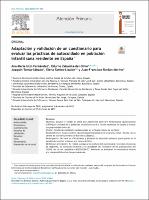Por favor, use este identificador para citar o enlazar este ítem:
https://repositorio.usj.es/handle/123456789/518
| Título : | Adaptación y validación de un cuestionario para evaluar las prácticas de autocuidado en población infantil sana residente en España |
| Otros títulos : | Adapting and validating a questionnaire to measure the self-care practices in healthy child population residing in Spain |
| Autor: | Urpi-Fernandez, Ana-Maria



Zabaleta del Olmo, Edurne 


Tomas-Sabado, Joaquin 


Tambo Lizalbe, Elena 

Roldan-Merino, Juan-Francisco 

|
| Palabras clave : | Autocuidado; Encuestas y cuestionarios; Estudios de validación; Escuelas; Niño; Psicometría; Promoción de la salud; Self-care; Surveys and questionnaires; Validation studies; Schools; Child; Psychometrics; Health promotion |
| Fecha de publicación: | 27-mar-2019 |
| Editorial : | EDICIONES DOYMA |
| Citación : | Urpi-Fernandez, A.-M., Zabaleta-del-Olmo, E., Tomas-Sabado, J., Tambo-Lizalde, E., & Roldan-Merino, J.-F. (2020). Adapting and validating a questionnaire to measure the self-care practices in healthy child population residing in Spain. Atencion Primaria, 52(5), 297-306. https://doi.org/10.1016/j.aprim.2018.10.004 |
| Resumen : | Objetivo: Adaptar y validar el Child and Adolescent Self-Care Performance Questionnaire (CASPQ) al contexto de la población infantil sana de 8 a 12 anos ˜ residente en Espana˜ y evaluar sus propiedades métricas. Diseno: ˜ Estudio de validación fundamentado en la Teoría Clásica de los Tests. Emplazamiento: Cuatro centros educativos participantes en el programa «Salut i Escola» de un centro de atención primaria de Barcelona (Espana). ˜ Participantes: Un total de 498 alumnos y alumnas de educación primaria participaron en el estudio durante los primeros seis meses de 2016. Mediciones principales: Se realizó la adaptación cultural del cuestionario. Se evaluó el proceso de respuesta, la estructura factorial y se analizaron las relaciones de las puntuaciones del CASPQ con las del cuestionario KIDSCREEN-27. Asimismo, se evaluaron la consistencia interna y la reproducibilidad de las puntuaciones.Resultados: Se obtuvieron 489 cuestionarios. El análisis factorial confirmatorio de su estructura teórica mostró un ajuste suficiente. Se observó una asociación positiva entre las puntuaciones del cuestionario y las del KIDSCREEN-27. La consistencia interna global fue satisfactoria; no obstante, la de cada factor fue marginal o moderada. La reproducibilidad de las puntuaciones fue óptima. Conclusiones: El CASPQ adaptado a la población infantil sana de 8 a 12 anos ˜ muestra unas propiedades métricas adecuadas y similares a las del cuestionario original. Por ello, es un instrumento útil para evaluar las prácticas de autocuidado y planificar intervenciones dirigidas a su promoción |
| Descripción : | Objective: To adapt and validate the Child and Adolescent Self-Care Performance Questionnaire (CASPQ) to the context of healthy children aged 8 to 12 years residing in Spain and evaluate their metric properties. Design: Validation study based on Classical Test Theory. Location: Four schools participating in the Salut i Escola programme of a Primary Care Centre of Barcelona (Spain). Participants: Four hundred and ninety-eight elementary school students participated in the study during the first six months of 2016. Main measurements: Cultural adaptation of the questionnaire was carried out. Response process and factorial structure were evaluated and the relationships of the adapted questionnaire scores with those of the KIDSCREEN-27 questionnaire were analysed. Likewise, internal consistency and reproducibility of the scores were evaluated. Results: Four hundred and eighty-nine questionnaires were obtained. The confirmatory factor analysis of its theoretical structure showed a sufficient adjustment. A positive association was observed between the questionnaire scores and those of KIDSCREEN-27. The overall internal consistency was satisfactory; nevertheless, that of each factor was marginal or moderate. The reproducibility of the scores was optimal. Conclusions: The CASPQ adapted to the healthy child population of 8 to 12 years old shows appropriate metric properties and similar to those of the original questionnaire. Therefore, it is a useful tool to assess self-care practices and plan interventions aimed at its promotion. |
| URI : | https://repositorio.usj.es/handle/123456789/518 |
| ISSN : | 1578-1275 |
| Aparece en las colecciones: | Artículos de revistas |
Ficheros en este ítem:
| Fichero | Descripción | Tamaño | Formato | |
|---|---|---|---|---|
| Adaptación y validación de un cuestionario para evaluar las prácticas de autocuidado en población infantil sana residente en España.pdf | 981,91 kB | Adobe PDF |  Visualizar/Abrir |
Este ítem está sujeto a una licencia Creative Commons Licencia Creative Commons

